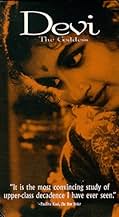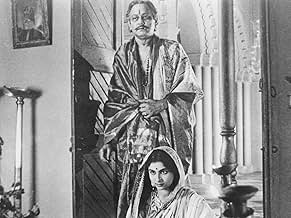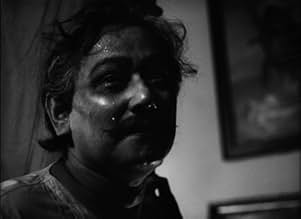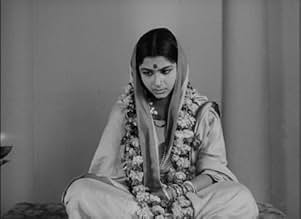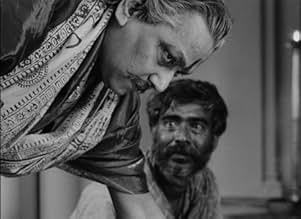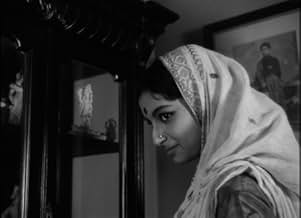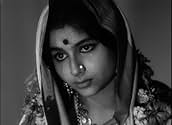CALIFICACIÓN DE IMDb
7.7/10
3.1 k
TU CALIFICACIÓN
Una joven es considerada diosa cuando su suegro, un rico terrateniente feudal, tiene un sueño en el que se la imagina como un avatar de Kali.Una joven es considerada diosa cuando su suegro, un rico terrateniente feudal, tiene un sueño en el que se la imagina como un avatar de Kali.Una joven es considerada diosa cuando su suegro, un rico terrateniente feudal, tiene un sueño en el que se la imagina como un avatar de Kali.
- Dirección
- Guionistas
- Elenco
- Premios
- 1 premio ganado y 1 nominación en total
Soumitra Chatterjee
- Umaprasad
- (as Soumitra Chattopadhyay)
Karuna Bannerjee
- Harasundari
- (as Karuna Bandyopadhyay)
Purnendu Mukherjee
- Taraprasad
- (as Purnendu Mukhopadhyay)
Arpan Chowdhury
- Khoka - Child
- (as Shriman Arpan Chowdhury)
Anil Chatterjee
- Bhudeb
- (as Anil Chattopadhyay)
- Dirección
- Guionistas
- Todo el elenco y el equipo
- Producción, taquilla y más en IMDbPro
Opiniones destacadas
Satyajit Ray made "Devi" in 1960. It was only his sixth film after completeing his 'Apu Trilogy' and "The Music Room" but it's much less well-known and little seen today. It's also a masterpiece. The great Chhabi Biswas, (he of "The Music Room"), once again plays a rich, lonely old man who comes to believe his daughter-in-law is a reincarnation of the Goddess Kali. If the tale is a fanciful one it's grounded in the harsh realities of the India of the time, (it's set in the mid-nineteenth century), and its heart is a heart of darkness. Goddess or witch, the end result is the same; such superstition can only have a tragic outcome and this is one of Ray's finest tragedies. Working again with what was basically his stock company, Ray draws superb performances from his cast and like so much of his work, this is a great ensemble piece, superbly shot by Subrata Mitra and scored by Ali Akbar Khan. It's a film that cries out for restoration and rediscovery.
This film was made in 1960. This is interesting because it is highly doubtful that the same film could be made in India today, in spite of India's massive film industry. The film does a great depiction of the crisis faced by people struggling to be modern yet encumbered with the traditional systems and the specter of having been colonized.
The younger son is ready to walk away from the bondage of traditional and as he sees, the superstition of the traditional life. Of course, he is reaping the benefit of life as a high caste. His young wife becomes the Devi - the embodiment of the goddess. This film also works well for its psychological content for the way we see the father project his desires onto those around him, and the choices faced by each character. In light of the fundamentalism worldwide - Christian, Muslim & Hindu - it is hard to image that this film could be made today in India since it leans to a skeptical view of Darsan and the goddess.
The younger son is ready to walk away from the bondage of traditional and as he sees, the superstition of the traditional life. Of course, he is reaping the benefit of life as a high caste. His young wife becomes the Devi - the embodiment of the goddess. This film also works well for its psychological content for the way we see the father project his desires onto those around him, and the choices faced by each character. In light of the fundamentalism worldwide - Christian, Muslim & Hindu - it is hard to image that this film could be made today in India since it leans to a skeptical view of Darsan and the goddess.
"Devi" (Hindi, 1960): Directed by Satyajit Ray, and banned in India until the intercession of Nehru, this is the story of a lovely 17 year old wife, who is suddenly labeled as a "Goddess" (while her husband is absent to complete his final exams in college), due to a dream ("vision") by her father-in-law. What follows is a fascinating, multi-angled look at the transitional Indian culture (and MOST cultures, frankly). Is this any different, any worse, or any more desperate than seeing the face of Jesus in a grilled cheese sandwich or the grain of a wooden door? Is her overnight change in status unique? Are the people who have confused motives, hopelessness, or malleable minds any less vulnerable here and now? The quality of the video copy I viewed was rough a copy of a copy of a copy yet even then, the power of Ray's vision shines through. This is a serious, beautiful, insightful, tragic film. (It has something of a "cousins" relationship to the film "Anchoress".)
After watching Satyajit Ray's The Apu Trilogy (1955-1959), which are now my favourite films of all time, I was looking forward to watching Devi, the next film Ray directed after The Apu Trilogy. Although I couldn't feel the same kind of emotional connection with the characters in Devi that I felt in The Apu Trilogy, this film was thought-provoking and very intriguing to watch.
Devi dealt with a serious issue in Bengali society at the time in a mature manner and Ray's direction and cinematography for this film was just as superb as The Apu Trilogy. It starred Soumitra Chatterjee and Sharmila Tagore once again as a married couple, like in Apur Sansar (the final part of The Apu Trilogy). However, whereas it was Soumitra who played the lead role in Apur Sansar, this time it's Sharmila who plays the lead role in Devi. Her performance was very subtle for the first half but her delusional performance towards the end was very convincing. Overall, I'd highly recommend this movie to any Satyajit Ray fan.
8/10
Devi dealt with a serious issue in Bengali society at the time in a mature manner and Ray's direction and cinematography for this film was just as superb as The Apu Trilogy. It starred Soumitra Chatterjee and Sharmila Tagore once again as a married couple, like in Apur Sansar (the final part of The Apu Trilogy). However, whereas it was Soumitra who played the lead role in Apur Sansar, this time it's Sharmila who plays the lead role in Devi. Her performance was very subtle for the first half but her delusional performance towards the end was very convincing. Overall, I'd highly recommend this movie to any Satyajit Ray fan.
8/10
A film that explores the line between the good aspects of faith (e.g. humility) and the bad (e.g. ignorance) when an elderly man has a dream that his daughter-in-law is the incarnation of the goddess Kali, and immediately begins venerating her. In Hinduism the idea of one of the deities from its pantheon incarnating as a mortal is fairly common and has some interesting and profound philosophical implications, but here we feel a deep sense of falseness and unease. When the young woman's husband returns to find her on a dais surrounded by chanting worshippers he eventually tries to get her out of there, but she begins to wonder whether she might indeed be Kali, and if leaving may cause the gods to inflict their wrath upon him. It all seems a little crazy - a single fleeting moment in an old man's dream, and suddenly streams of people are coming to a trapped young woman, some bearing sick children and expecting her to heal them.
Before the dream, the old man has a somewhat creepy relationship with her - for example, calling her 'mother' and praising her while she waits on him and tenderly washes his feet. Later we find out she's just 17 years old, and has been married for 3 years, causing some uncomfortable internal math even if it is based on the reality of 19th century India (and apparently a true story). Sharmila Tagore plays the conflicted aspects of the part well, and she was only 16 years old. I found that the film was an interesting look into the culture - and director Satyajit Ray's criticism of blind faith - but the pace of the film was a little too slow for what is a pretty simple story. It finishes strong though, and with some powerful images of Tagore.
Before the dream, the old man has a somewhat creepy relationship with her - for example, calling her 'mother' and praising her while she waits on him and tenderly washes his feet. Later we find out she's just 17 years old, and has been married for 3 years, causing some uncomfortable internal math even if it is based on the reality of 19th century India (and apparently a true story). Sharmila Tagore plays the conflicted aspects of the part well, and she was only 16 years old. I found that the film was an interesting look into the culture - and director Satyajit Ray's criticism of blind faith - but the pace of the film was a little too slow for what is a pretty simple story. It finishes strong though, and with some powerful images of Tagore.
¿Sabías que…?
- TriviaSharmila Tagore was just 15 when she filmed this role.
- Citas
Kalikinkar Roy: [while Doyamoyee strokes his feet] Do you know who I'm worried about? I'm worried about your Christian husband. You never know the intention of boys today.
- ConexionesFeatured in La historia del cine: Una odisea: Sex & Melodrama (2011)
Selecciones populares
Inicia sesión para calificar y agrega a la lista de videos para obtener recomendaciones personalizadas
- How long is The Goddess?Con tecnología de Alexa
Detalles
Taquilla
- Total en EE. UU. y Canadá
- USD 93,215
- Tiempo de ejecución1 hora 33 minutos
- Color
- Mezcla de sonido
- Relación de aspecto
- 1.37 : 1
Contribuir a esta página
Sugiere una edición o agrega el contenido que falta



